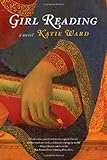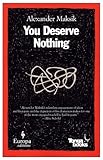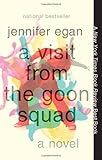Posted on April 6, 2012 in Books
Girl Reading by Katie Ward is another 2012 “TV Book Club” pick. As often is the case, I saw the episode before I read the book.
The premise is that this novel is really a series of short stories based on artwork featuring women’s reading. Each chapter is one standalone story with characters and often incorporating the creator or artist.
There are almost no quotation marks in this novel. The dialogue is written without them. I’ve read other books that employs this literally technique, notably Jose Saramago. It’s not my favourite thing in the world, but generally the books I read can get away with it because the editors realize the authors are decent enough otherwise to not employ them. Still, I generally won’t recommend a book such as this to everyone because that kind of technique can be warying to most readers if they are not use to it or have the patience for it.
The stories are all very different, but they all feature female characters. I found it was easy to be involved and interested in the characters; the author gave a good sense of them in less than 50 pages. There’s an element of art history in this along the lines of Girl with a pearl earring, and I would recommend it to be people who enjoy art, history, and female literature. I liked almost all the stories except the one taking place in 1914. I didn’t really care for any of the characters in that and it seemed even more aimless than the others.
Aside from that, I liked this book. If you have read it, I’d like to know your thoughts.
Read April 2nd-3rd, 2012.
Here is a snippet from the segment on “TV Book Club” featuring the author as well:
Posted on March 27, 2012 in Books
This book is on this series “Tv Book Club”. Since I read at least a couple of books from each series of the show, I have decided to put it as a tag. As of this review, I have not seen the show’s segment on it and may never so I can’t speculate on what the panel said or thought.
When I heard about the premise of the book, I was interested by the setting of Paris and the illicit nature of the relationship between two of the main characters. When I first started the book, I found the prose is a bit strange and clipped, cool. There was a bit of second person narrative or rather the main characters seem to talk to themselves and refer to ‘you’ a lot. Still, after the initial pages, it was mostly first person.
I went through this book much quicker than I thought. It was an easy read though it had some darker issues about growing up, isolation, and ultimately, loneliness. The author is good at describing loneliness. There were some very Paris moments in the book which I enjoyed as that is one of my favourite cities.
You deserve nothing is adult fiction, but allegedly the author based it on his own experiences. I can see that because a lot of the feelings in the book and the situations seemed real. I could see how people at the age were and remembered it. Though, these kids had vastly different issues than I did. I didn’t relate to their disillusionment of Will the main character, but I understood it.
There is one sex scene in this novel that is actually well written. I find most sex scenes in novels either badly written or unremarkable. In this novel, it was well done and fitting for the characters and the scene.
The ending and a lot of the novel reminded me of Muriel Spark’s The Prime of Miss Jean Brodie. I’m not sure I actually liked the ending of this book; it just seemed to be just there. Maybe that was the point. I did want more from the characters.
Read March 16th, 2012.
Posted on February 3, 2012 in Books
I learned about this book from the UK book show “The TV Book Club” I have read a couple of books from the show, and it’s probably one of the only places I seek to find new books from other than saying randomly at the library.
I have generally mixed feelings about this book. I completely forgot the premise and the structure from the segment on the show I watched back in July. In short the book is a series of short stories and while the characters are all connected in some way to two of the “main” characters, you don’t really see it until the latter half of the book. Also, the narrative structure differs from chapter to chapter: first person, second, third, editorial style, etc. There is one wonderful chapter done in a graphical slide show format which was the highlight of the book.
The characters are hard to grasp since some of them only show up for one chapter. It also felt experimental at times which can be good actually. I think it worked out for the most part. I don’t know if I would recommend this book to everyone because the uneven structure can be confusing at times especially if you read books in small sittings (which I didn’t so it was ok for me to keep track of mostly).
I was a bit surprised to hear that this book won the Pulitzer Prize. I have read a lot of Pulitzer prize winners over the years, but this may not be the most memorable. To the book’s merit, I think Egan does showcase how transient life is in these stories. By jumping around time, the reader sees how people change, but you won’t necessarily see how those changes happen. I guess this makes the book more realistic, but I can see how some people who like more linear and regular narration wouldn’t enjoy that. I will say, I liked a couple chapters more than others.
If you are interested, you can watch the Youtube video of the book on “The TV Book Club” here:
Read on January 16th, 2012.


